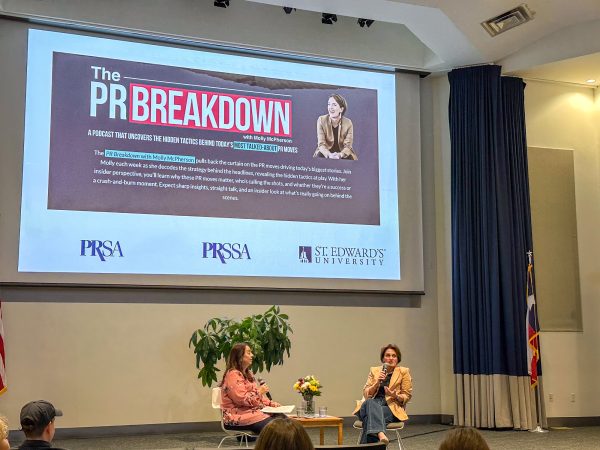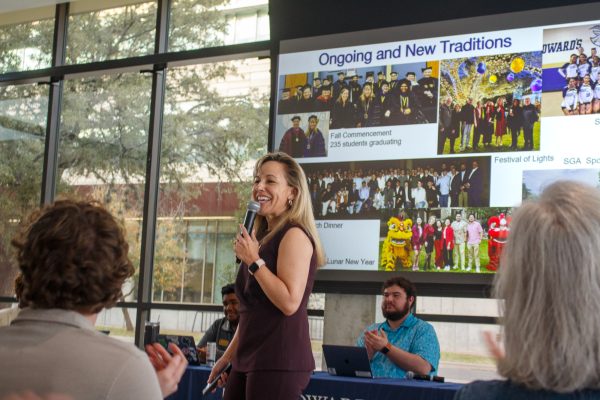Biology student wins award
Before Dec. 6, James McCann was just an ambitious student studying philosophy and biology. However, after receiving attention for his work with cystic fibrosis, the 22-year-old senior from St. Edward’s University was someone the New York Times considered noteworthy.
McCann received the Undergraduate Oral Award for Microbiological Sciences Research at the 10th Annual Biomedical Research Conference for Minority Students. The award was granted for research he conducted alongside Dr. Megan Boulette in the lab of Dr. Marvin Whitely at the University of Texas at Austin last summer.
Although McCann plans to pursue biology in the future, he credited his philosophy degree as the tool that put him above the other contestants.
“I really think my philosophy degree helped me with my biology because it gave me better reading skills, and it really taught me how to write and get my point across and also talk the way I did,” McCann said. “You can do research, but you also have to explain it on many different levels and almost sell your research, so I guess that was what the award was for—being able to talk about my research cogently from beginning to end.”
McCann was one of the students featured in the New York Times article “The Country Can Learn a Lesson From These Students,” published Dec. 6. Brent Staples, the reporter, wrote that McCann is “a quiet young man…who wowed the conference with his work on a bacterium that preys on victims of cystic fibrosis.” Although his name has appeared in the Times, McCann remains humble.
“It was kind of like this surreal experience. I never really expected to be in the New York Times,” McCann said. “The one thing that it’s really helped me with is that it’s opened so many doors for me. Because of the New York Times article, I got the travel grant to go to New Orleans in May and also recently got a job out in Georgetown…doing cancer research for a biotech company out there.”
The CEO of Molecular Templates contacted McCann the day the article came out. McCann will be spending about 20 hours a week working in the lab with RNA, tissue culture and DNA.
McCann credits much of his success to how the science department is structured at St. Edward’s because it has given him the opportunity to spend a lot of time in the lab.
“One thing I really love about St. Edward’s, and I got the difference from UT, was that St. Ed’s does a lot of research but its emphasis is undergraduate research, and that’s really beneficial,” James said. “It gets them in the lab [and] gets them to see how science actually works from beginning to end. It’s not this five-step real formulaic scientific method that you learn in like second grade.”
The faculty at St. Edward’s, William Quinn and Patricia Baynham in particular, have infused their love for biology in their students.
“To be honest, all the professors over there have facilitated and really conveyed their enthusiasm for biology and research, which I think really helps all students…so I can’t pick one person, but Dr. Quinn was kind of the guy,” McCann said. “He was my freshman bio professor. He’s the one who I walked in the first day and I was … hooked at that point.”
Baynham, who was McCann’s microbiology teacher, said that he sets a good example for other science students by taking advantage of all of the research opportunities that are available.
“He has a lot of scientific curiosity,” Baynham said. “Students like James make students realize that it’s not just medical school after graduation.”
Quinn noted that McCann’s philosophy background will help him in his pursuit of microbiology because of his grasp of ethics.
“Because of his interest in philosophy, he’s just got a really well-founded background in Catholic theology, and he has a clear sense of Catholic social justice,” Quinn said.
Even after the wide range of attention, McCann maintains the sensibility of a senior working hard to graduate.
“He is down-to-earth. Clearly, when he succeeds, he doesn’t succeed at another person’s expense,” Baynham said.
After graduating, McCann plans to do more research and then pursue graduate school.
“It’s a hard task to become a good scientist, so that is why I want to spend more time in the lab to get to be able to do that,” McCann said.






